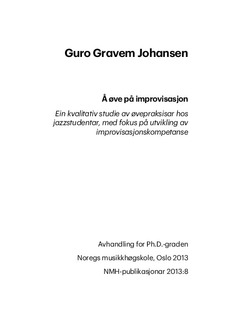Å øve på improvisasjon. Ein kvalitatitv studie av øvepraksisar hos jazzstudentar, med fokus på utvikling av improvisasjonskompetanse
Doctoral thesis, Peer reviewed
Permanent lenke
http://hdl.handle.net/11250/172637Utgivelsesdato
2013Metadata
Vis full innførselSamlinger
- NMH-publikasjoner [121]
Sammendrag
The thesis To practise improvisation. A qualitative study of practising practices among jazz students, with a particular focus on the development of improvisation competence is aimed at illuminating the motives, goals, objects and modes of actions that distinguish instrumental practising among jazz students, and at increasing the knowledge of how improvisation competence can be developed through practising. The rationale of the study is based on the assumption and potential dilemma that musical improvisation often imply playing something different from what one has practised, in order to create spontaneously in an aural, interactive and unpredictable musical context. The empirical data consists of 13 qualitative, semi-structured interviews with students within higher jazz education in Norway and Sweden, distributed on different main instruments. The interviews were triangulated with a follow-up case study with three of these students, where Stimulated Recall interviews based on individual as well as collective practise sessions were used. The study employs Activity Theory as the basic theoretical framework. Instrumental practise is seen as a cultural-historically developed activity, with its meaning and motives derived from the basic activity of performing in the jazz tradition. Practising practices are determined by the social world constituted by the educational environment and the wider jazz field, including norms, values and the use of cultural tools. The concept of expansive learning is employed to analyze learning activity that is potentially open-ended. The findings show how the participants emphasize the development of a personal “sound” or “voice”. They search for a high degree of autonomy and ownership with respect to the choice and utilization of learning material, and towards the institution and teachers. Objects of practising improvisation span from gaining control of technicalities, such as rhythmic time feel, feeling of form, chords, scales and motor skills; to processual aspects of improvising, such as increasing musical association abilities, letting go of cerebral control in the moment, etc. Practising can involve experimenting with musical conventions and instrument norms connected to a traditional division of labour in band contexts. The concept explorational practise is launced to capture these experimental and improvisational aspects, as supplement to the scholarly established concept deliberate practise. Findings also point to how collective music making practices such as playing in bands motivates and give meaning to individual practise. Practising in bands is thus considered as a necessary learning arena for developing abilities specific to the interactive situation, such as responding to each other and developing ideas collectively.
Beskrivelse
Avhandling (Ph.D.) - Norges musikkhøgskole, 2013
